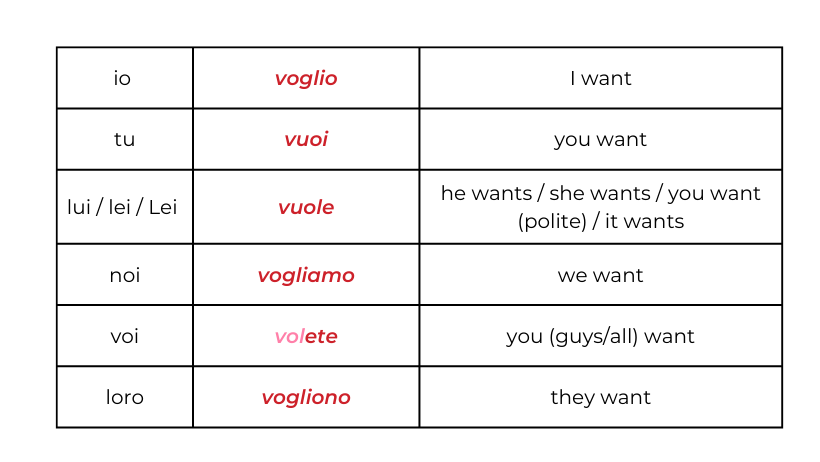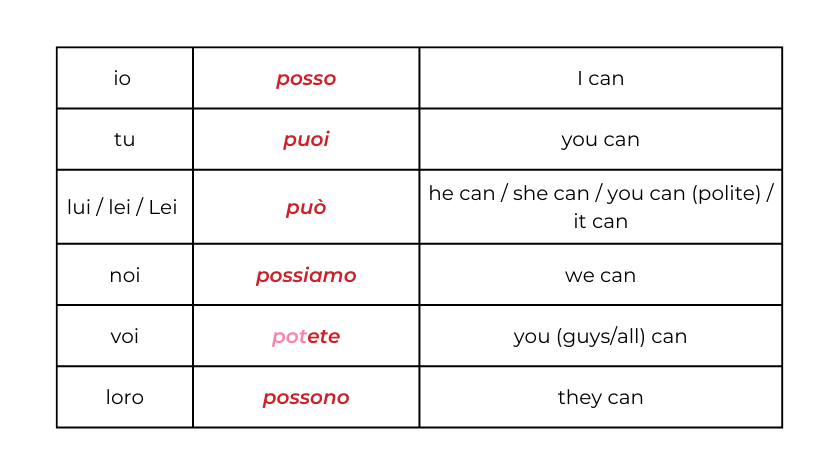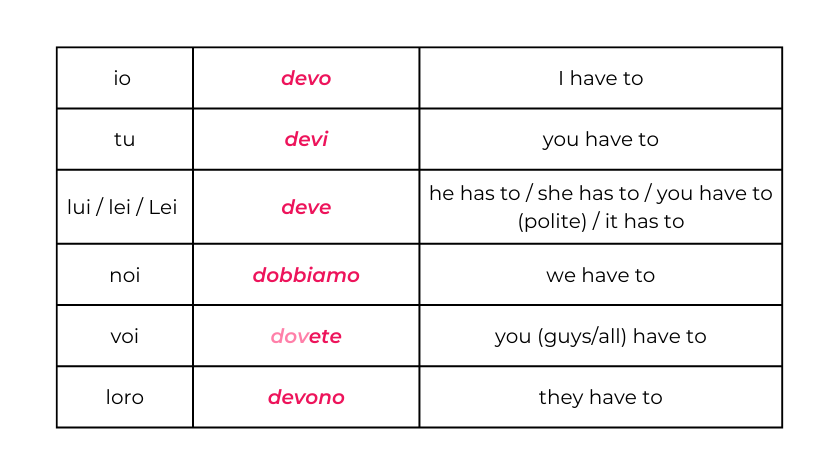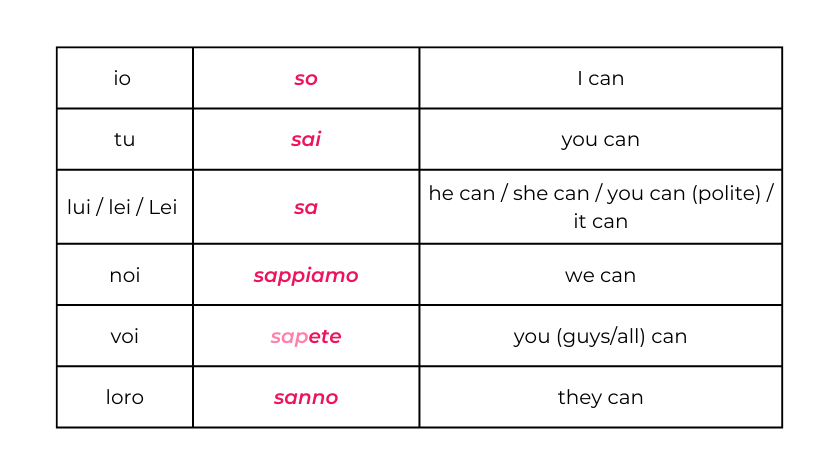Modal verbs in Italian are the verbs that express a kind of “modality” to the action being talked about, meaning that they express concepts such as desire, possibility, probability, and obligation. English and Italian both use modal verbs in a very similar way, so the concept is relatively easy to grasp.
Just like in English, Italian uses modal verbs in two-verb constructions, where you have the modal verb conjugated for the appropriate Subject, followed by the main verb in its Infinitive form.
The four most common Italian modal verbs that you absolutely need to know how to use as a beginner are:
◉ VOLERE to want
◉ POTERE to be able to / can
◉ DOVERE to have to / must
◉ SAPERE to know / can
These modal verbs, like most very common verbs in Italian, are all irregular, so you will need to learn their particular conjugations by memory. You will notice, however, that for each of these modal verbs the 2nd Person Plural (VOI – ‘you guys’) form is always regular, so that makes life a bit easier!

VOLERE to want
To say what you or other people want to do is one of the most common things that we express in our daily lives. The verb VOLERE is essentially used in the exact same way as it is in English: to express that you want ‘something’ or that you want ‘to do something’.
The conjugation for the verb VOLERE is laid out in the table below.
VOLERE to want

To use the modal verb VOLERE with other verbs to say that someone wants ‘to do something’, you use the following structure:
[VOLERE] + INFINITIVE
VOGLIO MANGIARE ➙ I want to eat
VUOI PRENDERE ➙ you want to take
LEI VUOLE DORMIRE ➙ she wants to sleep
VOGLIAMO FARE ➙ we want to do
VOLETE SCEGLIERE ➙ you guys want to choose
VOGLIONO FINIRE ➙ they want to finish
POTERE to be able to / can
Although the verb POTERE translates to “able to” and “can”, it is not used in every situation that we use “can” in English. The two main scenarios in which POTERE is used in Italian are:
1️⃣ Expressing ability or possibility of doing something in a given moment
For example:
◉ We can ask him if he wants to come
◉ What can I do to help?
2️⃣ Expressing permission to do something, synonymous with “may”
For example:
◉ Can/may I please go now?
◉ You can/may take three of these
The other very common scenario that we use “can” in English but which POTERE is NOT used in Italian is to express ability or skill, in the sense that you know how to do something.
For example:
◉ I can speak five languages
◉ Marco can play the piano
◉ Can they read and write?
The verb POTERE is NOT used for this “can” scenario. The verb used in this case is SAPERE, which we address soon.
The conjugation for the verb POTERE is laid out in the table below.
POTERE to be able to / can

To use the modal verb POTERE with other verbs to say that someone ‘can do something’, you use the following structure:
[POTERE] + INFINITIVE
POSSO MANGIARE ➙ I can eat
PUOI PRENDERE ➙ you can take
LEI PUÒ DORMIRE ➙ you sir/ma’am can sleep
POSSIAMO FARE ➙ we can do
POTETE SCEGLIERE ➙ you guys can choose
POSSONO FINIRE ➙ they can finish

DOVERE to have to / must
The modal verb DOVERE expresses obligation. While “to have to” and “must” are used in slightly different scenarios and contexts in English, both of these meanings are covered by the verb DOVERE in Italian.
The conjugation for the verb DOVERE is laid out in the table below.
DOVERE to have to / must

To use the modal verb DOVERE with other verbs to say that someone ‘has to do something’, you use the following structure:
[DOVERE] + INFINITIVE
DEVO MANGIARE ➙ I have to eat
DEVI PRENDERE ➙ you have to take
LUI DEVE DORMIRE ➙ he has to sleep
DOBBIAMO FARE ➙ we have to do
DOVETE SCEGLIERE ➙ you guys have to choose
DEVONO FINIRE ➙ they have to finish
SAPERE to know / can
As explained before, there are two ways to express the concept of “can” in Italian. SAPERE on its own simply means “to know”, but when used as a modal verb, it expresses the ability or skill of doing something, in other words, knowing how to do something.
The conjugation for the verb SAPERE is laid out in the table below.
SAPERE to know / can

To use the modal verb SAPERE with other verbs to say that someone ‘can do something’, you use the following structure:
[SAPERE] + INFINITIVE
SO PARLARE ➙ I can speak
SAI APRIRE➙ you can open
LUI SA TOGLIERE ➙ he can remove
SAPPIAMO FARE ➙ we can do
SAPETE COSTRUIRE ➙ you guys can construct
SANNO PULIRE ➙ they can clean

